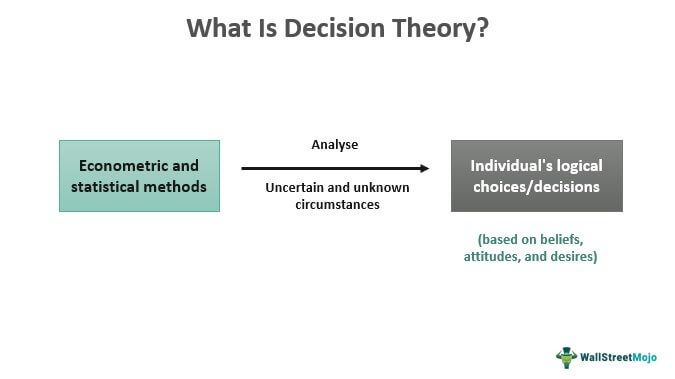Table Of Contents
What Is Decision Theory?
Decision theory refers to a range of econometric and statistical tools for analyzing an individual's choices. In other words, it lets the entity make the best logical decision possible when dealing with uncertain and unknown circumstances. Analysts call it a theory of choice, relying on beliefs, attitudes, and desires.

Companies worldwide use decision theory to understand better how people make decisions and the market trend to make better commercial judgments. The theory has two types: normative and descriptive, commonly used by mathematicians, economists, marketers, data and social scientists, biologists, psychologists, philosophers, and politicians.
Key Takeaways
- Decision theory involves economic and statistical approaches for studying an individual's choices. Because it is based on ideas, attitudes, and wishes, analysts refer to it as a theory of choice.
- It enables the entity to make the most rational decision feasible in unknown and uncertain conditions, repercussions, and behaviors.
- Companies worldwide utilize this theory to understand better how customers make decisions and market trends to make better business decisions.
- Mathematicians, economists, marketers, data and social scientists, biologists, psychologists, philosophers, and politicians use two theory forms: normative and descriptive.
Two Types Of Decision Theory
Decision theory helps entities determine how a professional or consumer makes rational choices while making a decision. When a person makes a decision, their belief system, morals, values, social background, and even fears and uncertainty play a crucial role. Uncertainties such as states, repercussions, and behaviors cause people to choose one option.
The theory allows businesses to identify and solve problems with existing products or services and understand their target users when launching new ones. It is, thus, the basis of understanding a successful business, marketing strategy, and behavioral changes.

The method is an important aspect of everyday living since it aids in identifying a pattern or trend in a person's life. It always answers the questions and the logic that underpins them. Even the smallest life decisions reveal a lot about a person. For example, why do people like a particular political party, their views on marriage, their favorite color, or why they wish to visit a location with mountains or beaches, whether they drive to work or take the bus? In other words, why is a person the way they are?
The individual choices are heavily influenced by circumstances, repercussions, and behaviors that can be understood in two types:

#1-Normative Decision Theory
This decision analysis theory analyzes the repercussions of ideal logical decisions based on a set of values. It also decides the optimum course of action based on limits and assumptions. However, it does not consider other factors interfering with it. Instead, it deals with expected behavior, decision-making processes, and the best potential outcome. This theory employs tools, procedures, and computer applications to arrive at an optimal decision.
#2 - Optimal Decision Theory
This quantitative and qualitative method, often known as descriptive decision theory, examines the decisions made by irrational people. Furthermore, this theory employs various frameworks, hypotheses, and functions to comprehend practical actions that follow a set of norms.
Companies use the decision theory in operation research because it considers several outcomes, rational reasoning, and influencing factors to understand how a person thinks logically rather than idealistically.
The theory analyzes how and why a person made a decision, the reasons for that decision, and when and where that decision was made because location and time are crucial in decision making.
Examples
Let us look at the following decision theory examples to understand the concept better:
Example #1
Firm A has had a monopoly in the industry for more than a decade. It is the market leader for various reasons, such as quality, pricing, brand value, recognition and awareness, goodwill, availability, good customer service, marketing strategy, seasonal product launches, etc. Therefore, there was no rivalry for firm A at first.
Company B, a new competitor, is about to enter the market. It uses decision theory in statistics to figure out how company A became the market leader, why customers prefer its products, what company A offers that makes it a popular choice, and when and where company A sells the most. It helps firm B in deciphering client demand and behavior.
Example #2
People are nothing more than the results of their own choices. Companies can read, attract, influence, and control users' minds, which contradicts the decision-making theory. Social media and online streaming platforms track viewers’ choices, such as pages they visit, the content they like, dislike, share, post, etc.
Netflix is an example of how viewers watch more than just an algorithm to attract and become addicted. In addition, a new web series is often released a day before the holiday or only on weekends, a specific type of content is always present in the Instagram feed, and one particular YouTube video suggestion is returning over and over again.
